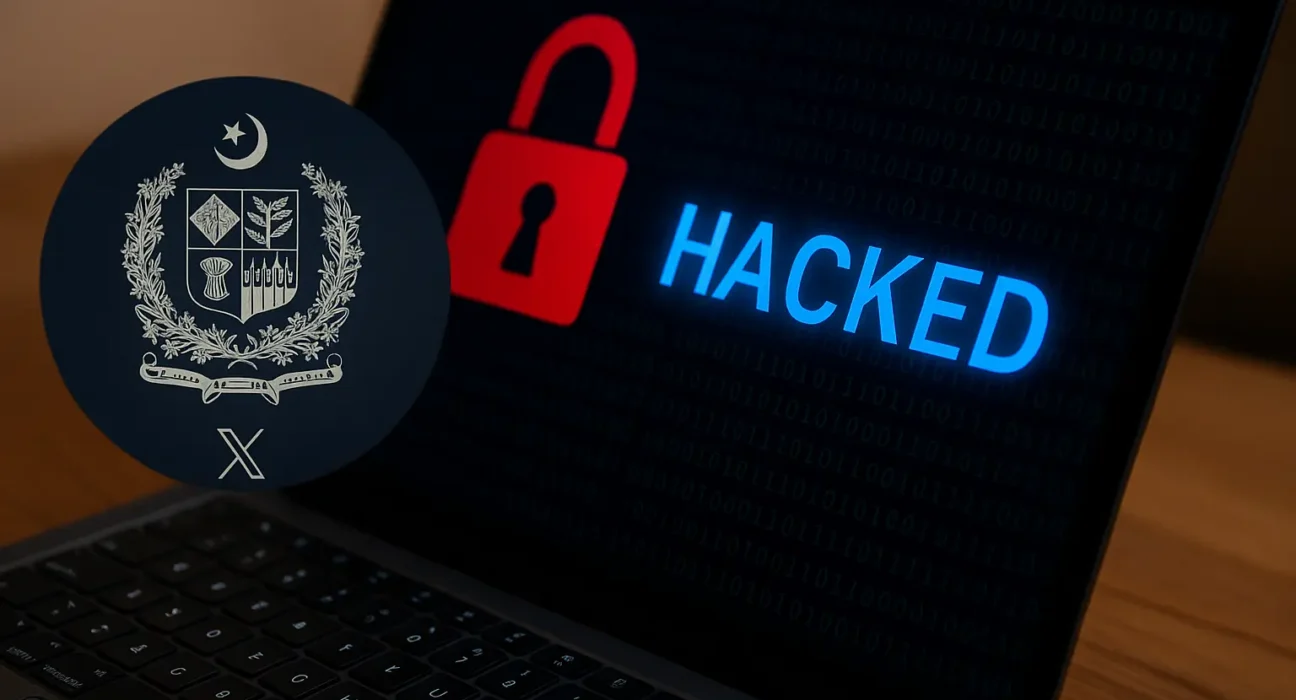Pakistan Ministry of Economic Affairs X Account Hacked Amid Rising Cyber Threats

In a worrying trend emerging in the menace of cybercrime in the region, the official X (formerly Twitter) account of Pakistan’s Ministry of Economic Affairs was hacked. Due to the breach, there was a temporary sharing of a false post about India-Pakistan tensions, which threw people off before the authorities got it under control.
This explosion occurs at a time of heightened regional conflict and heightened cyber activity and state institutions are growing more and more prone to cyber attack and disinformation campaigns.
Unauthorized Content Sparks Brief Alarm
The breach led to the publication of unauthorized content implying a dramatic run up to India-Pakistan relations. A few minutes later, screenshots had been widely circulated on social media networks, attractively the attention of citizens and journalists.
Nevertheless, the Ministry of Economic Affairs officials moved quickly. An official spokesman said the account had been hacked and the post did not represent the Ministry’s official thinking.
“All content without permission had been removed. The post is false and should not be given any attention,” the statement said.
Submission of the content on a fast lane, followed by issuance of clarification, the ministry ensured that there is no further spread of misinformation across platforms.
Cybersecurity Advisory Highlights Regional Risk
The attack comes as Pakistan’s Computer Emergency Response Team (CERT) recently issued a warning. CERT informs that hacker gangs are using the ever present frictions around the Line of Control (LoC) to disperse wrong information, throw disproportional ball within communication channel and stir up people’s feeling.
These actors are supposedly using phishing campaign, fake new alerts, and misinformation strategies targeting both civilian and government institution. The advisory of CERT calls for caution and multi-stratagem cyber security protocol.
Misuse of Social Media: A Tool for Psychological Warfare
Government accounts that have been hacked represent a special threat. They allow for bad faith hackers to publish official-looking content that deceives the public and, possibly, sours diplomatic relations. Here a mistruth concerning India-Pakistan relations was capable of incensing public passions and shaping national opinion.
Such strategies belong to the larger Trojan horse strategy called information warfare in which cyber tools are used to create chaos, produce fear, and undermine faith in state institutions.
Fake narratives are incubators in social media platforms, such as, X, Facebook and WhatsApp. Security specialists in cyber space note that governments should not only protect the digital resources, but also educate the public about verifying sources and spotting disinformation.
Government Response and Mitigation Measures
As a reaction to the attack, the Ministry of Economic Affairs confirmed that two factor authentication is now activated for all official accounts. There are ongoing security audits to free any further vulnerabilities.
Pakistan’s Ministry of IT and Telecommunication is also collaborating with global cybersecurity vices to find the source of the breach. While it is unknown whether it was Independent hackers or state sponsored attackers which launched the attack, officials believe there is some coordinated effort to attack public confidence.
“This is not only a technical problem. It’s a matter of national security,” a high-ranking official of the IT ministry said.
Public Urged to Avoid Sharing Unverified Information
Considering the situation authorities are appealing to citizens to be careful on both consumption and sharing of content online. Spread of unverified posts casually can trigger panic and misinformation and degrade the country’s image.
They are being advised to depend on updates from verified government handles and reliable news houses. The social media users should not respond emotionaly to posts that have no credible sources.
“Everyone whatever you’re doing, you’ve got a digital responsibility. Don’t be the reason someone believes a lie,” cybersecurity expert Shoaib Nisar warned during a recent TV interview.
Experts Recommend Strengthening Cyber Hygiene
Cybersecurity specialists have also ended up with a set of guidelines for individuals and organizations;
• Have strong unique passwords for your accounts.
• Enable multi-factor authentication (MFA)
• Do not use harmful links or unknown attachments, click.
• Made frequent trials and updates on software and internet browser plugins.
• Deposit a suspicious online activity with the concerned authorities
The Ministry has pledged to launch an awareness campaign on digital safety that will sensitize users on phishing and fake and impersonation scams.
Global Trends Reflect Growing Threat to Government Accounts
This incident is not isolated. Hacktivists and intelligence hacking have grown in their targets on social media accounts owned by governments and militaries all over the globe. From the United States Pentagon and British Ministry of Defense to ministries in Eastern Europe high profile accounts are being used for political propaganda and psychological influence operations.
Pakistan’s case is an addition to a mounting pile of evidence that cyberspace has turned into the new battleground, where lines between diplomacy, warfare, and journalism merge.
Final Thoughts: Securing the Digital Frontline
The digital invasion of Pakistan’s Ministry of Economic Affairs X account is more than a faceless digital embarrassment; it is a call from sleep that applies to both sides of the nation. At a time when the Twitter can rattle markets and foreign perceptions, digital security must be as important as physical security.
In moving fast and in a transparent manner the ministry was able to ease the panic and correct falsehoods. As we proceed, institutional cyber preparedness, public awareness, and digital literacy will play key roles in thwarting subsequent threats of that nature.









